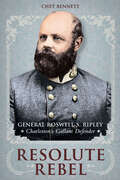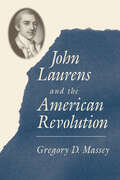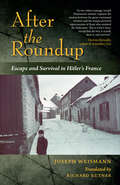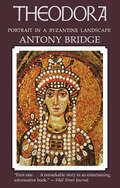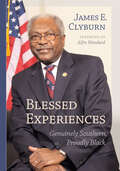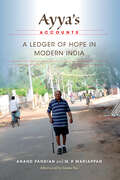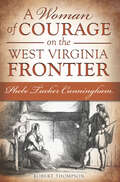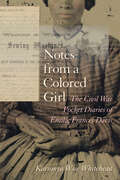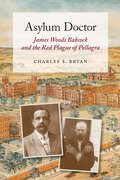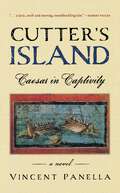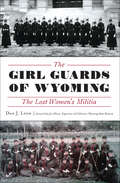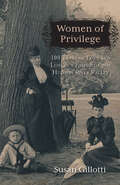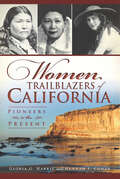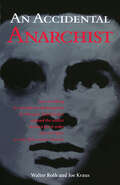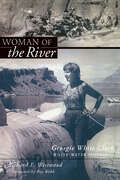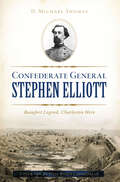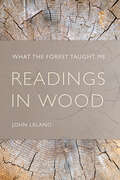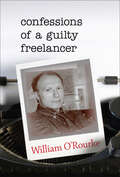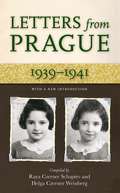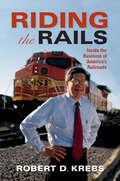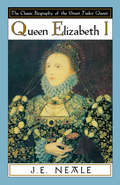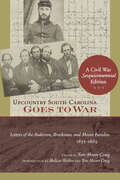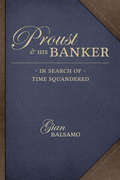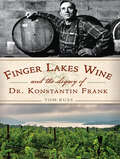- Table View
- List View
Resolute Rebel: General Roswell S. Ripley, Charleston's Gallant Defender
by Chet BennettThe first biography of the general’s complex, often contradictory military service in the US and Confederate armies and his postwar British exploits.Roswell S. Ripley (1823–1887) was a man of considerable contradictions exemplified by his distinguished antebellum service in the US Army, followed by a controversial career as a Confederate general. After the war he was active as an engineer/entrepreneur in Great Britain. Author Chet Bennett contends that these contradictions drew negative appraisals of Ripley from historiographers, and in Resolute Rebel Bennett strives to paint a more balanced picture of the man and his career.Born in Ohio, Ripley graduated from the US Military Academy and served with his classmate Ulysses S. Grant in the Mexican War, during which Ripley was cited for gallantry in combat. In 1849 he published The History of the Mexican War, the first book-length history of the conflict. While stationed at Fort Moultrie in Charleston, Ripley met his Charleston-born wife and began his conversion from unionism to secessionism. After resigning his US Army commission in 1853, Ripley became a sales agent for firearms manufacturers. When South Carolina seceded from the Union, Ripley took a commission in the South Carolina Militia and was later commissioned a brigadier general in the Confederate army. Wounded at the Battle of Antietam in 1862, he carried a bullet in his neck until his death. Unreconciled in defeat, Ripley moved to London, where he unsuccessfully attempted to gain control of arms-manufacturing machinery made for the Confederacy, invented and secured British patents for cannons and artillery shells, and worked as a writer who served the Lost Cause.After twenty-five years researching Ripley in the United States and Great Britain, Bennett asserts that there are possibly two reasons a biography of Ripley has not previously been written. First, it was difficult to research the twenty years he spent in England after the war. Second, Ripley was so denigrated by South Carolina’s governor Francis Pickens and Gen. P. G. T. Beauregard that many writers may have assumed it was not worth the effort and expense. Bennett documents a great disconnect between those negative appraisals and the consummate, sincere military honors bestowed on Ripley by his subordinate officers and the people of Charleston after his death, even though he had been absent for more than twenty years.“A vitally useful addition to the Civil War Charleston literature.” —Civil War Books and Authors“[A] deeply researched and closely argued study. General Roswell S. Ripley emerges from the margins of Civil War history thanks to the able pen of Chet Bennett.” —A. Wilson Greene, author of Civil War Petersburg: Confederate City in the Crucible of War
John Laurens and the American Revolution
by Gregory D. MasseyAn &“excellent biography&” of General Washington&’s aide-de-camp, a daring soldier who advocated freeing slaves who served in the Continental Army (Journal of Military History). Winning a reputation for reckless bravery in a succession of major battles and sieges, John Laurens distinguished himself as one of the most zealous, self-sacrificing participants in the American Revolution. A native of South Carolina and son of Henry Laurens, president of the Continental Congress, John devoted his life to securing American independence. In this comprehensive biography, Gregory D. Massey recounts the young Laurens&’s wartime record —a riveting tale in its own right —and finds that even more remarkable than his military escapades were his revolutionary ideas concerning the rights of African Americans. Massey relates Laurens&’s desperation to fight for his country once revolution had begun. A law student in England, he joined the war effort in 1777, leaving behind his English wife and an unborn child he would never see. Massey tells of the young officer&’s devoted service as General George Washington&’s aide-de-camp, interaction with prominent military and political figures, and conspicuous military efforts at Brandywine, Germantown, Monmouth, Newport, Charleston, Savannah, and Yorktown. Massey also recounts Laurens&’s survival of four battle wounds and six months as a prisoner of war, his controversial diplomatic mission to France, and his close friendship with Alexander Hamilton. Laurens&’s death in a minor battle in August 1782 was a tragic loss for the new state and nation. Unlike other prominent southerners, Laurens believed blacks shared a similar nature with whites, and he formulated a plan to free slaves in return for their service in the Continental Army. Massey explores the personal, social, and cultural factors that prompted Laurens to diverge so radically from his peers and to raise vital questions about the role African Americans would play in the new republic. &“Insightful and balanced . . . an intriguing account, not only of the Laurens family in particular but, equally important, of the extraordinarily complex relationships generated by the colonial breach with the Mother Country.&” —North Carolina Historical Review
After the Roundup: Escape and Survival in Hitler's France
by Joseph WeismannA Jewish man recounts his experience as a little boy in Paris during World War II and the Holocaust, as well as his escape and survival in this memoir.On the nights of July 16 and 17, 1942, French police rounded up eleven-year-old Joseph Weismann, his family, and 13,000 other Jews. After being held for five days in appalling conditions in the Vélodrome d’Hiver stadium, Joseph and his family were transported by cattle car to the Beaune-la-Rolande internment camp and brutally separated: all the adults and most of the children were transported on to Auschwitz and certain death, but 1,000 children were left behind to wait for a later train. The French guards told the children left behind that they would soon be reunited with their parents, but Joseph and his new friend, Joe Kogan, chose to risk everything in a daring escape attempt. After eluding the guards and crawling under razor-sharp barbed wire, Joseph found freedom. But how would he survive the rest of the war in Nazi-occupied France and build a life for himself? His problems had just begun.Until he was 80, Joseph Weismann kept his story to himself, giving only the slightest hints of it to his wife and three children. Simone Veil, lawyer, politician, President of the European Parliament, and member of the Constitutional Council of France—herself a survivor of Auschwitz—urged him to tell his story. In the original French version of this book and in Roselyne Bosch’s 2010 film La Rafle, Joseph shares his compelling and terrifying story of the Roundup of the Vél’ d’Hiv and his escape. Now, for the first time in English, Joseph tells the rest of his dramatic story in After the Roundup.“As few others manage, Joseph Weismann’s memoir captures the tension between the great communal torment and the unique personal repercussions of those who endured the Holocaust. This is a boy’s story, except that boy is in hell, faces it, and survives.” —Thomas Keneally, author of Schindler’s List“Extraordinary . . . and timely. Joseph Weismann’s compelling account of his escape from an internment camp after the notorious Winter Velodrome roundup of Parisian Jews in July 1942 is both a vivid recreation of childhood (he was 11 years old when he spent a tenacious six hours crawling through a barbed wire fence to make his getaway) and a powerful insight into what it is like to be on the receiving end of the demonization of a race or religion.” —Peter Grose, author of A Good Place to Hide
Theodora: Portrait in a Byzantine Landscape
by Antony Bridge&“First rate popular history/biography, evoking the Byzantine empire at its peak. A remarkable story in an entertaining, informative book.&” —The Wall Street Journal This is the biography of a Byzantine courtesan who rose from the gutter to the throne of an empire. It is a romantic and improbable story, and Theodora is an extraordinary woman, indeed. Her background and her many actions were scandalous, but she had qualities of greatness and this book sets the record straight. This account of her life is a pageant in which Emperors and barbarian kings, Popes and Patriarchs, eunuchs and generals, heretics and orthodox opponents, charioteers and ladies of easy virtue, saints and sinners move in a formal and splendid rhythm. This formality was often marred by violence: one of the worst riots in Byzantine history took place when Theodora had been empress for a short time, and during much of her reign there was war in Italy, marked by appalling suffering and barbarity. Toward the end of her life, Constantinople was devastated by Bubonic plague. Yet Theodora triumphed over every adverse circumstance, tough and clever to the end. &“ . . . Bridge&’s book, with its exceptionally vivid and evocative style, brings the period alive.&” —Library Journal &“Puts [Theodora] in her own time and place in the vast panorama of the golden age of an empire which lasted 1,100 years.&” —Boston Herald &“Conveys the passion and the fervor of the sixth century A.D.&” —Los Angeles Herald Examiner
Blessed Experiences: Genuinely Southern, Proudly Black
by James E. Clyburn“Shares lessons learned on his way from the Jim Crow South to a top spot on Capitol Hill . . . [a] remarkably candid new memoir” —NPRFrom his humble beginnings in Sumter, South Carolina, to his prominence on the Washington, D.C., political scene as the third highest-ranking Democrat in the House of Representatives, US Congressman James E. Clyburn has led an extraordinary life. In Blessed Experiences, Clyburn tells in his own inspirational words how an African American boy from the Jim Crow-era South was able to beat the odds to achieve great success and become, as President Barack Obama describes him, “one of a handful of people who, when they speak, the entire Congress listens.”Born in 1940 to a civic-minded beautician and a fundamentalist minister, Clyburn began his ascent to leadership at the age of twelve, when he was elected president of his National Association for the Advancement of Colored People (NAACP) youth chapter. He broke barriers through peaceful protests and steadfast beliefs in equality and justice. As a civil rights leader at South Carolina State College, as human affairs commissioner under John C. West and three subsequent governors, and as South Carolina’s first African American congressman since 1897, Clyburn has established a long and impressive record of public leadership and advocacy for human rights, education, historic preservation, and economic development.Includes a foreword from Emmy Award–winning actress and the congressman’s longtime friend Alfre Woodard“Blessed Experiences has captured not just the history of this tireless leader’s more-than-four decades in public service, but also a sense of the times.” —Warren Buffett
Ayya's Accounts: A Ledger of Hope in Modern India
by Anand Pandian M. P. Mariappan“An absorbing exploration of one man’s life” —as an orphan, refugee, shopkeeper, and grandfather—through a century of upheaval in India (Library Journal).Born in colonial India into a despised caste of former tree climbers, Ayya lost his mother as a child and came of age in a small town in lowland Burma. Forced to flee at the outbreak of World War II, he made a treacherous 1,700-mile journey by foot, boat, bullock cart, and rail back to southern India.Becoming a successful fruit merchant, Ayya educated and eventually settled many of his descendants in the United States. Luck, nerve, subterfuge, and sorrow all have their place along the precarious route of his advancement. Emerging out of tales told to his American grandson, Ayya’s Accounts embodies a simple faith—that the story of a place as large and complex as modern India can be told through the life of a single individual.“At once a mesmerizing memoir of an ordinary man’s life and an anthropologist’s revealing examination of the astounding changes experienced by persons and families . . . impossible to put down.” —South Asia“No one deemed a superhero by the movies has had a more interesting life with such extraordinary sweep.” —Scott Simon, NPR Weekend Edition
A Woman of Courage on the West Virginia Frontier: Phebe Tucker Cunningham
by Sir Robert ThompsonAuthor Robert Thompson recounts the harrowing story of Phebe Tucker Cunningham, from her marriage at Prickett's Fort to her return to the shores of the Monongahela.Life on the West Virginia frontier was a daily struggle for survival, and for Phebe Tucker Cunningham, that meant the loss of her four children at the hands of the Wyandot tribe and being held captive for three years until legendary renegades Simon Girty and Alexander McKee arranged her freedom. Thompson describes in vivid detail early colonial life in the Alleghenies and the ways of the Wyandot, providing historical context for this unforgettable saga.
Notes from a Colored Girl: The Civil War Pocket Diaries of Emilie Frances Davis (Women's Diaries and Letters of the South)
by Karsonya Wise WhiteheadThis historical biography provides a scholarly analysis of the personal diaries of a young, freeborn mulatto woman during the Civil War years.In Notes from a Colored Girl, Karsonya Wise Whitehead examines the life and experiences of Emilie Frances Davis through a close reading of three pocket diaries she kept from 1863 to 1865. Whitehead explores Davis’s worldviews and politics, her perceptions of both public and private events, her personal relationships, and her place in Philadelphia’s free black community in the nineteenth century. The book also includes a six-chapter historical reconstruction of Davis’s life.While Davis’s entries provide brief, daily snapshots of her life, Whitehead interprets them in ways that illuminate nineteenth-century black American women’s experiences. Whitehead’s contribution of edited text and original narrative fills a void in scholarly documentation of women who dwelled in spaces between white elites, black entrepreneurs, and urban dwellers of every race and class.Drawing on scholarly traditions from history, literature, feminist studies, and sociolinguistics, Whitehead investigates Davis’s diary both as a complete literary artifact and in terms of her specific daily entries. With few primary sources written by black women during this time in history, Davis’s diary is a rare and extraordinarily valuable historical artifact.
Asylum Doctor: James Woods Babcock and the Red Plague of Pellagra
by Charles S. BryanThis biography of an early twentieth-century South Carolina doctor sheds light on his pioneering work with the mentally ill to combat a public health scourge.Thousands of Americans died of pellagra before the cause—vitamin B3 deficiency—was identified. Credit for solving the mystery is usually given to Dr. Joseph Goldberger of the US Public Health Service. But in Asylum Doctor, Charles S. Bryan demonstrates that a coalition of American asylum superintendents, local health officials, and practicing physicians set the stage for Golberger’s historic work—chief among them was Dr. James Woods Babcock.As superintendent of the South Carolina State Hospital for the Insane from 1891 to 1914, Babcock sounded the alarm against pellagra. He brough out the first English-language treatise on the subject and organized the National Association for the Study of Pellagra. He did so in the face of troubled asylum governance which, coupled with Governor Cole Blease’s political intimidation and unblushing racism, eventually drove Babcock from his post. Asylum Doctor describes the plight of the mentally ill in South Carolina during an era when public asylums had devolved into convenient places to warehouse inconvenient people. It is the story of an idealistic humanitarian who faced conditions most people would find intolerable. And it is important social history for, as this book’s epigraph puts it, “in many ways the Old South died with the passing of pellagra.”
Cutter's Island: Caesar in Captivity
by Vincent Panella&“This vivid short novel . . . of Caesar&’s youthful adventure. . . . Matches the film Gladiator in its vigorous, viscerally affecting depiction of ancient Rome.&” —Publishers Weekly Most of us are familiar with the Caesar of Shakespeare and Shaw. We know him primarily as the manipulative warlord and statesman. But what about the Caesar of Plutarch and Suetonius—historians who dealt with Caesar as a young man? Here, in this stunning novel, written with all the excitement and eloquence of an epic poem, we find Caesar at the age of twenty-five captured by pirates as he sails to the Island of Rhodes to study rhetoric with the renowned Apollonias Moon. &“An alternately rousing and touching adventure tale that offers an intriguing glimpse into the future dictator's psyche...[and] a panoramic view of Rome. . . . Stirring.&” —Booklist &“ . . . A lyric, swift and moving, swashbuckling tale&” —Robert Fagles, award-winning translator of The Iliad &“Cutter&’s Island is a perfect flawless gem, without a false note anywhere.&” —Steven Pressfield, author of Gates of Fire
The Girl Guards of Wyoming: The Lost Women's Militia (Military Ser.)
by Dan J LyomIn the summer of 1890, an army of teenage women with swords drawn and rifles at the ready marched resolutely toward the state capitol to deliver a message to Governor Francis E. Warren and the nation: women want equal rights. As Company K walked alongside women's suffrage pioneer Esther Morris, one could hear the rhythm of their feet keeping step in perfect cadence. Western history remembers murderers, outlaws, prostitutes and saloon girls but not the famous Girl Guards, whose military precision rivaled that of West Point cadets. Author Dan J. Lyon offers the definitive and evocative account of the young women warriors who defined the Equality State.
Women of Privilege: 100 Years of Love & Loss in a Family of the Hudson River Valley
by Susan GillottiDrawing on &“a treasure trove of family records&”, this biography of the women of a prominent Hudson Valley, New York family is &“riveting and moving.&” (Miriam Cohen, Evalyn Clark Professor of History, Vassar College) Carolyn Heilbrun, in Writing a Woman&’s Life, said there are far too few books about the real lives of women. Women of Privilege helps to fill that gap. Susan Gillotti provides us an insight into her ancestors&’ heretofore secret lives, culled from their private diaries, letters and journals. Up to now, these intimate narratives have been the private thoughts of four generations of women who inhabited Grasmere, one of the great houses of The Hudson River Valley, where they lived among the Delanos, the Vanderbilts and the Roosevelts. On the surface, their lives seemed ideal, but beneath that facade, there were mental illness, alcoholism, yearning for divorce and questions of sexual identity. Written by Susan Gillotti, the great-great-granddaughter of Sarah Minerva Schieffelin, this fascinating and revealing book is part biography, part memoir and part social history. &“A riveting read—one cannot stop until the final outcome of these powerful, but flawed, lives is revealed.&” —Peter H. Brink, former senior vice president, Programs, National Trust for Historic Preservation &“Susan Gillotti weaves . . . the stories of her mother and grandmothers, bravely, sometimes desperately, trying to claim their independence from social straight jackets, and succeeding.&” —Georgina Forbes, artist
Women Trailblazers of California: Pioneers to the Present
by Hannah S. Cohen Gloria G HarrisIn a series of biographical profiles, this volume celebrates the lives and achievements of women who made history in the Golden State. Throughout California&’s history, remarkable women have been at the core of change and innovation. In this fascinating volume, Gloria Harris and Hannah Cohen relate the stories of forty women whose struggles and achievements have paved the way for generations. Coming from all walks of life and entering a variety of fields—from activism and conservation to science, medicine, entertainment, and more—these women overcame prejudice, skepticism and injustice to prove that women can do anything. Visionary architect Julia Morgan designed Hearst Castle; Dolores Huerta co-founded United Farm Workers; Donaldina Cameron, the angry angel of Chinatown, rescued brothel workers; and silent film actress Mary Pickford helped form United Artists Pictures. From fearless pioneers to determined reformers, Harris and Cohen chronicle the triumphs and disappointments of diverse women who dared to take risks and break down barriers.
Accidental Anarchist: How the Killing of a Humble Jewish Immigrant by Chicago's Chief of Police Exposed the Conflict Between Law & Order and Civil Rights in Early 20th Century America
by Walter Roth Joe KrausIt was a bitter cold morning in March, 1908. A nineteen-year-old Jewish immigrant traversed the confusing and unfamiliar streets of Chicago–a one-and-a-half-hour-long journey–from his ghetto home on Washburne Avenue to the luxurious Lincoln Place residence of Police Chief George Shippy. He arrived at 9 a.m. Within minutes after knocking on the front door, Lazarus Averbuch lay dead on the hallway floor, shot no less than six times by the chief himself. Why Averbuch went to the police chief's house or exactly what happened after that is still not known. This is the most comprehensive account ever written about this episode that stunned Chicago and won the attention of the entire country. It does not "solve" the mystery as much as it places it in the context of a nation that was unsure how to absorb all of the immigrants flowing across its borders. It attempts to reconstruct the many different perspectives and concerns that comprised the drama surrounding the investigation of Averbuch's killing.
Woman of the River: Georgie White Clark White-Water Pioneer
by Richard WestwoodThe great adventurer who helped make whitewater rafting a beloved national pastime comes to vivid life in this rollicking biography. Georgie White Clark—adventurer, raconteur, eccentric—first came to know the canyons of the Colorado River by swimming portions of them with a single companion. She subsequently hiked and rafted portions of the canyons, increasingly sharing her love of the Colorado River with friends and acquaintances. At first establishing a part-time guide service as a way to support her own river trips, Clark went on to become perhaps the canyons&’ best-known river guide, introducing their rapids to many others, both on the river, via her large-capacity rubber rafts, and across the nation, via magazine articles and movies. Georgie Clark saw the river and her sport change with the building of Glen Canyon Dam, enormous increases in the popularity of river running, and increased National Park Service regulation of rafting and river guides. Adjusting, though not always easily, to the changes, she helped transform an elite adventure sport into a major tourist activity.
Confederate General Stephen Elliott: Beaufort Legend, Charleston Hero (Civil War Ser.)
by D. Michael ThomasThis Civil War biography offers a lively account of the Confederate brigadier general whose defense of Fort Sumter was honored by the Union Army. General Stephen Elliott rose from captain of a militia artillery battery to command of an infantry brigade. His early war reputation as a daring raider and superb artilleryman grew to true hero status through his exemplary service at Fort Sumter. Handpicked to defend Sumter to the last extremity, Elliott performed so well that his Yankee foes saluted him by dipping the Union flag in recognition of his courage and steadfastness. Wounded on five separate occasions, Elliott exemplified courage and inspirational leadership that justified promotions advocated by Generals Robert E. Lee, P.G.T. Beauregard, and President Jefferson Davis. In the first in-depth study of Elliott, D. Michael Thomas presents the life of a renowned soldier with fresh, previously unpublished material.
Readings in Wood: What the Forest Taught Me
by John Leland“[Leland] brings the botanical into direct relationship with the spiritual, using a prose style that is as profound as it is pyrotechnic.” —Jim Warren, Washington and Lee UniversityAward-winning nature writer John Leland offers a collection of twenty-seven short, poetic essays that marry science and the humanities as the author seeks meaning in trees. Readings in Wood is an investigation of trees and forests and also of wood as a material that people have found essential in the creation of society and culture. Leland views with wit and erudition the natural world and the curious place of human beings as saviors and destroyers of this world.At once personal memoir, natural history, and cultural criticism, the book reflects Leland’s idiosyncratic vision. As vast as a forest, topics range from tree grain and leaf shape to economic theories, mathematics, and engineering. Readings in Wood is a hybrid testament of science, faith, superstition, and disbelief learned from sitting on tree trunks and peering at leaves and fungi. Leland hopes others will join him in nature’s classroom. Quite aware of the irony, he reminds us, “These leaves you desultorily turn over once hung in a green wood gone to make this book. Touching a book, you touch a tree. I pray that Readings in Wood’s essays, touching you, may justify in some small way the trees who died in their making.”“This book constitutes a hymn to the technical and the beautiful, a meander through the geography, geology, botany, mathematics and vigor of our plants, especially in the southern Appalachians.” —R. T. Smith, editor, Shenandoah, and writer-in-residence, Washington and Lee University“Informative, thoughtful, inspiring, and innately entertaining.” —The Midwest Book Review
Lincoln's Springfield Neighborhood
by Richard E. Hart Bonnie E PaullWhen an emotional Abraham Lincoln took leave of his Springfield neighbors, never to return, his moving tribute to the town and its people reflected their profound influence on the newly elected president. His old neighborhood still stands today as a National Historic Site. The story of the life Lincoln and his family built there returns to us through the careful work of authors Bonnie E. Paull and Richard E. Hart. Journey back in time and meet this diverse but harmonious community as it participated in the business of everyday living while gradually playing a larger role on the national stage.
Confessions of a Guilty Freelancer
by William O'RourkeFrom an acclaimed writer and journalist, essays containing “a brilliant overview of American history from the 1960s to the post 9/11 era” (Maura Stanton, author of Immortal Sofa: Poems by Maura Stanton).William O’Rourke’s singular view of American life over the past 40 years shines forth in these short essays on subjects personal, political, and literary, which reveal a man of keen intellect and wide-ranging interests. They embrace everything from the state of the nation after 9/11 to the author’s encounter with rap, from the masterminds of political makeovers to the rich variety of contemporary American writing. His reviews illuminate both the books themselves and the times in which we live, and his personal reflections engage even the most fearful events with a special humor and gentle pathos. Readers will find this richly rewarding volume difficult to put down.“O’Rourke has always had his finger on the pulse of the contemporary American literary scene.” —Corinne Demas, author of The Writing Circle“With sparkling wit that never takes a vacation, [O’Rourke] is our unpaid public intellectual number one.” —Jaimy Gordon, author of Lord of Misrule, winner of the 2010 National Book Award for Fiction“O’Rourke’s . . . writing is literary, without a doubt, but his style is conversational, rhythmic and leavened by a dry sense of humor that engage the reader on an intimate level.” —South Bend Tribune“[T]hose who enjoy a good romp through some of our country’s most pivotal times in the company of an astute observer who is unafraid to offer a penetrating, and sometimes scathing, critique of the state of the nation, will find themselves well matched.” —ForeWord Reviews“O’Rourke’s descriptions of the writing life have the ring of absolute truth.” —Review of Contemporary Fiction
Letters from Prague: 1939–1941
by Helga Weinberg Raya C SchapiroCorrespondence documenting a Jewish family&’s personal history of the Holocaust and World War II. Raya Schapiro and Helga Weinberg found a box of letters among their mother&’s effects after her death in 1990. They were written by their grandmother and uncle, trapped in Prague after the Nazi occupation, to the girls&’ parents who had escaped to the United States in May, 1939, leaving behind Raya and Helga, who were five and seven years old at the time. The seventy-seven letters reprinted here span a period of two years, during which the Nazis drew an ever-tightening noose of destruction around the Jews of Prague: each letter is followed by notes of explanation and amplification, as well as notes on Nazi laws and official restrictions and the progress of the war. Each letter has a censor&’s stamp on it; each envelope bears the still-frightening emblem of the Third Reich. The letters dramatically convey the tension, growing daily, of existence under the Nazis, and their tone becomes increasingly desperate as every avenue of escape reaches a dead end. Praise forLetters from Prague: 1939–1941&“This book turns an abstraction into a palpable terror and pity.&” —Chicago Tribune&“A compelling and personal insight into the horrors of the Holocaust.&” —Booklist&“As it turned out, the girls escaped only after months of bureaucratic wrangling, while the grandmother and uncle never obtained permission to leave and were deported to the gas chambers at Treblinka and Auschwitz two years later. Collected here is the moving correspondence between the adults in Prague and the girls&’ parents in the U.S.&” —Publishers Weekly
Riding the Rails: Inside the Business of America's Railroads (Railroads Past and Present)
by Robert D. KrebsA former Burlington Northern Santa Fe Railway CEO tells the behind-the-scenes story of the transformation and resurgence of America’s ailing railroads.When Robert D. Krebs joined the ranks of Southern Pacific Railroad in 1966, the industry had been in decline for decades, and the future of trains was in peril. Despite these obstacles, Krebs fell in love with the rugged, competitive business of railroads and was determined to overcome its resistance to change and put rail transportation back on track.By the age of forty, Krebs was president of the Southern Pacific Railroad and had also served as chief executive of both the Santa Fe Railway and Burlington Northern Santa Fe Railway companies. Riding the Rails: Inside the Business of America’s Railroads details Krebs’s rise to a position of influence in the recovery of America’s railroads—and offers a unique insider’s view into the boardrooms where executives and businessmen reimagined transportation in the United States.
Queen Elizabeth I: A Biography
by J.E. NealeA scholarly and immensely readable, award-winning biography of the monarch known as the “Virgin Queen.”This has long been considered the classic biography of the great Tudor Queen. It is one of the first works of history to receive both scholarly and popular acclaim—testimony, indeed, to both its authority and readability. It has won the James Tait Black Memorial Prize for Biography and has been translated into nine languages.Exploring every aspect of Elizabeth’s life and rule—her shrewd policies at home and abroad—Professor Neale establishes the fact that she was unique as a strong-minded, independent woman ruling in an age of exclusively masculine power.Praise for Queen Elizabeth I“Entirely delightful, witty and gallant in defense, and nothing better has been said on the side of Elizabeth, on this side of idolatry.” —New York Times“Professor Neale’s narrative is straightforward and at times brilliant. . . . A first-rate literary biography.” —New Statesman“There can be no doubt about its scholarship. . . . Merely as a tour de force the book is a remarkable performance.” —American Historical Review
Upcountry South Carolina Goes to War: Letters of the Anderson, Brockman, and Moore Families, 1853–1865
by Tom Moore CraigThis collection of Civil War correspondence chronicles the lives and concerns of three Confederate families in Piedmont, South Carolina.The letters in Upcountry South Carolina Goes to War provide valuable firsthand accounts of both battlefronts and the home front, sharing rich details about daily life as well as evolving attitudes toward the war. As the men of service age from each family join the Confederate ranks, they begin writing from military camps in Virginia and the Carolinas, describing combat in some of the war’s more significant battles. Though they remain staunch patriots to the Southern cause until the bitter end, the surviving combatants write candidly of their waning enthusiasm in the face of the realities of combat. The corresponding letters from the home front offer a more pragmatic assessment of the period and its hardships. Emblematic of the fates of many Southern families, the experiences of these representative South Carolinians are dramatically illustrated in their letters from the eve of the Civil War through its conclusion.
Proust & His Banker: In Search of Time Squandered
by Gian BalsamoThis study explores the surprising relationship between Proust’s creative genius, his financial extravagance, and the steady hand that kept him afloat.What Marcel Proust wanted from life most of all was unconditional requited love, and the way he went after it—smothering the objects of his affection with gifts—cost him a fortune. To pay for such extravagance, he engaged in daring speculations on the stock exchange. The task of his cousin and financial adviser, Lionel Hauser, was to make sure these speculations would not go sour. In Proust and His Banker, Gian Balsamo examines this vital, complex relationship and reveals that the author’s liberal squandering of money provided the grist for many of the fictional characters and dramatic events he wrote about.Focusing on hundreds of letters between Proust and Hauser among other archival and primary sources, Balsamo provides a fascinating window into the writer’s creative process, his financial activities, and the surprising relationship between the two. Successes and failures alike provided material for Proust’s fiction, whether from the purchase of an airplane for the object of his affections or the investigation of a deceased love’s intimate background. Over the course of their fifteen-year collaboration, the banker saw Proust squander three-fifths of his wealth. To Hauser the writer was a virtuoso in resource mismanagement. Nonetheless, Balsamo shows, we owe it to the altruism of this generous relative, who never thought twice about sacrificing his own time and resources to Proust, that In Search of Lost Time was ever completed.
Finger Lake Wine and the Legacy of Dr. Konstantin Frank (American Palate)
by Tom RussThe remarkable story of a refugee from Soviet Ukraine who found his way to upstate New York—and changed the American wine industry. Dr. Konstantin Frank forever changed the palate of American wine. Forced from his home in Soviet Ukraine during World War II, he was astounded by the terroir when he arrived in the Finger Lakes region, an agricultural scientist from a foreign land desperately looking for work. Against popular notions, he believed that the vinifera grapes that produced some of Europe&’s and California&’s finest wines would prosper in this part of New York State, but was met with skepticism and resistance. He proved his detractors wrong, and because he shared his knowledge freely with others, Konstantin&’s innovativeness has allowed the region to produce some of the world&’s finest Riesling, Chardonnay, Pinot Noir, and other varietals. Four generations of Franks have continued his legacy, and their winery has won record numbers of prestigious awards every year. This book tells the inspiring story. Includes photographs
